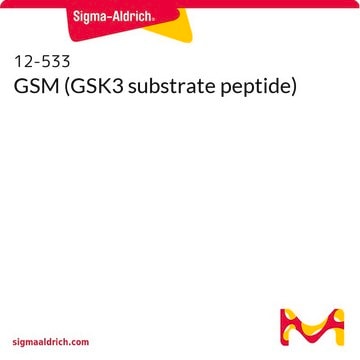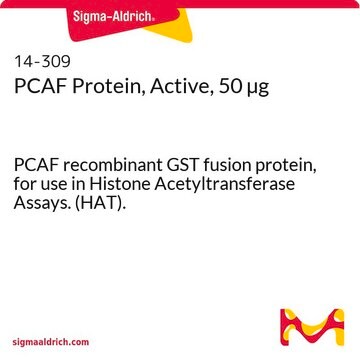14-306-M
Białko GSK3β, aktywne, 10 µg
Active, N-terminal His6-tagged recombinant human GSK3β with an H350L mutation, for use in Kinase Assays.
About This Item
Polecane produkty
pochodzenie biologiczne
human
Poziom jakości
rekombinowane
expressed in baculovirus infected Sf21 cells
Formularz
liquid
masa cząsteczkowa
Mw 51 kDa
skład
mercaptoethanol, 0.1-1%
saccharose, 5-10%
producent / nazwa handlowa
Upstate®
warunki przechowywania
(Tightly closed)
metody
activity assay: suitable (kinase)
rozpuszczalność
water: soluble
numer dostępu NCBI
numer dostępu UniProt
informacje o genach
human ... GSK3B(2932)
Opis ogólny
Research area: Cell Signaling
Działania biochem./fizjol.
Opakowanie
Jakość
Inne uwagi
Informacje prawne
Inhibitor
produkt powiązany
przeciwciało
Hasło ostrzegawcze
Warning
Zwroty wskazujące rodzaj zagrożenia
Zwroty wskazujące środki ostrożności
Klasyfikacja zagrożeń
Skin Sens. 1
Kod klasy składowania
12 - Non Combustible Liquids
Klasa zagrożenia wodnego (WGK)
WGK 2
Temperatura zapłonu (°F)
Not applicable
Temperatura zapłonu (°C)
Not applicable
Certyfikaty analizy (CoA)
Poszukaj Certyfikaty analizy (CoA), wpisując numer partii/serii produktów. Numery serii i partii można znaleźć na etykiecie produktu po słowach „seria” lub „partia”.
Masz już ten produkt?
Dokumenty związane z niedawno zakupionymi produktami zostały zamieszczone w Bibliotece dokumentów.
Nasz zespół naukowców ma doświadczenie we wszystkich obszarach badań, w tym w naukach przyrodniczych, materiałoznawstwie, syntezie chemicznej, chromatografii, analityce i wielu innych dziedzinach.
Skontaktuj się z zespołem ds. pomocy technicznej







